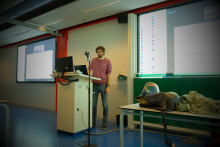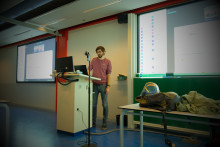The UT wants to professionalise the PhD programme, including through increased attention to personal development, social responsibilities and academic training. ‘In addition, we would like to know how the doctoral degree candidate experiences the programme and where problem areas lie,’ said Paul van Dijk, director of the Twente Graduate School. ‘That is why we started this survey, which we are going to repeat every year. The ambition is to score an eight on average, in two years' time.’
Comments
The results do not disappoint Van Dijk. ‘We do of course receive criticism every now and then; and often rightly so. For example, about the range of courses we offer and that they fill up quickly, or about the registration system and the PhD candidate monitoring system, which are not very user-friendly. We already knew that and we are busy remedying it; there are more intake moments for popular courses and we will improve the systems. In addition, we are also working with the Centre of Expertise in Learning and Teaching (CELT) to set up an introductory course for PhD candidates who will teach. This course will be added to the current range.’
Grip
In 2014, the UT established a PhD Charter and a PhD candidate monitoring system to get a better grip on the programme. PhD students draw up a plan with the supervisor at the beginning and they must earn 30 credits for courses in their field of study. ‘That suits the UT,’ says Van Dijk. ‘After all, we do not just want to deliver doctoral theses, we wish most of all to turn out broadly developed, trained people. The skills you acquire can be put to great use in your later career. We want to achieve this with the lowest possible drop-out rate and the least delay during the time that they are working on their doctorates.’








